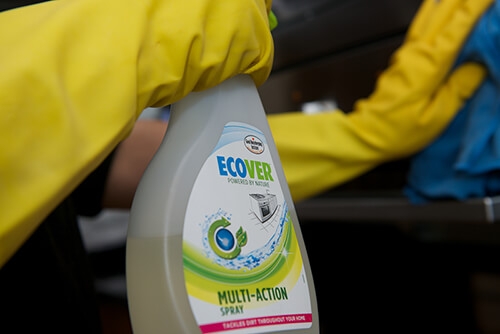The Ten Amendments of Cleaning
1. Thou shalt clean up all spills as soon as possible after they occur. Thus thou shalt save thyself a world of bother, as the stains shall not dry in place, requiring considerable elbow grease and effort to remove. However, thou shalt also use thy noggin and not try to wipe spills off a red-hot element, burning thy fingers nastily in the process.
2. Thou shalt not use poisons for cleaning benches where food is prepared. Instead, thou shalt use the natural cleaning products that thy God hath created, such as vinegar and baking soda. Thus thou shalt not consume minute traces of wicked chemicals.

3. Thou shalt clean thy refrigerator on a regular basis to avoid the growth of mould and the proliferation of vile stenches. The best way to clean a refrigerator is to switch the power off at the wall and remove all the items therein. Then thou shalt clean the interior of thy fridge with baking soda and a soft, damp cloth, remembering that the most efficient way of cleaning refrigerators is to work from top to bottom. Finally, thou shalt rinse any residue of baking soda from the walls, door and floor with a clean damp cloth.
4. Remember thy floor, to keep it regularly mopped and vacuumed. And for the slothful or those burdened greatly with many labours, if thy kitchen floor is clean, the whole house looks cleaner. Cleaning the floor of the kitchen can be done with the vacuum (daily or twice weekly, depending on how messy thy household is and whether or not ye eat in the kitchen) or with the mop. Extremely dirty floors should be cleaned with a scrubbing brush and warm soapy water, drying the floor as thou goest with a series of old towels.
5. Thou shalt have separate chopping boards for cutting meat and cutting other substances. The chopping board used for chopping meat should be sterilized with boiling water. For this reason, thou art advised to use a wooden chopping board for meat, as this shall not melt or have the surface damaged by hot water.
6. Thou shalt not use the tea towels to dry thine hands, nor shalt thou use the hand towel for drying the dishes.
7. Thou shalt change tea towels and dish cloths daily, sending the old ones to the laundry for cleaning. For verily, these are a breeding ground for bacteria.
8. Thou shalt cover frying food with a lid while cooking, else thou wilt cover all the top of the stove and thy splash guard with grease, which is difficult to clean. However, cleaning grease off the stove top can be accomplished with baking soda and a damp cloth, or with an Enjo cloth designed for the purpose. If unsuccessful (no blame hereth) you can always call a professional oven cleaning technician
9. Thou shalt keep thy rubbish covered, for thus thou shalt deter vermin (including greedy cats and dogs) from raiding therein. Furthermore, this prevents bad smells. To remove smells from inside the rubbish bin, sprinkle baking soda inside, as this absorbs smells.
10. Thou shalt rinse all dishes as soon as the meal is finished. This makes it easier to clean the dishes either in the dishwasher of when washing dishes by hand.

Miscellaneous Kitchen Tips
At the same time the kitchen is a place where women (and men!) have passed on tips and hints, and exchanged knowledge as well as preparing food and caring for the family. Here is a selection of handy hints for the kitchen, more or less at random, like life and work in the kitchen often is.
Straight Milk
To save money in the kitchen, in many recipes that call for straight milk, you can replace this with a mixture of 50% milk and 50% water. This works well for roux sauces, poached fish, and soups, but it probably not best for custards or custard-style puddings. Just plain water can be used in making cakes and pancakes – it’s lower in fat, too.
Brown Bananas
If you get left with brown bananas in the cupboard (children sometimes refuse to eat bananas once the fruit resemble leopards) but you don’t want to make a banana cake right now, mash the bananas and freeze them until you need to make a cake. Normally, bananas turn black if you freeze them in their skins, and the pulp will turn yellow-brown. This isn’t a problem with banana cakes, as the brown tinge will put in some natural colour. Lemon juice added to the mashed pulp adds a bit of zing.
Milk Past Expiry Date
Slighty sour milk (e.g. one day past the best-by date, but no more than this!) can be used in baking – scones, cakes and muffins all taste good with soured milk. If you’re not sure, taste a drip of the milk. If it is bitter, don’t use it (pour it down the sink or onto the compost heap) but if it only tastes slightly abnormal but palatable, then use it in baking – or give it to the dog.
Cutting Cakes
Do you ever struggle to cut a cake horizontally so you can fill it with jam or cream (or both)? Use a length of tough sewing cotton, clean dental floss or even a length of very fine (and clean!) wire. Hold both ends of the thread firmly and embed the cotton about halfway down one side of the cake. Then wrap the lengths around the cake and hold them in one hand. The thread may start cutting into the cake at this stage. With your free hand, push lightly on the cake to keep it steady, and pull the thread through the cake with your other hand.
Checking Egg Freshness
If you aren’t sure about how fresh an egg is, drop it gently into a deep dish of water – the water should be twice as deep as needed to cover the egg. If the egg is fresh, it will sink. If it floats, it’s rotten and should be buried deep in the compost heap so you can’t smell it when it explodes (alternatively, use it as bait if you go fishing for eels). If it keeps one little bit on the bottom of the dish but looks like it is about to take off any moment, it is OK but won’t taste as good as fresh eggs. Use it in a cake or in a meatloaf.
Keep Cleanliness in Kitchen Cupboards
To make sure that the cupboard where you keep your spreads stays cleaner for longer, put the jars holding the spreads onto a plate or a small serving tray, which you can change every so often. All the gunk that inevitably trickles down the sides, plus the crumbs and oil that get stuck on jar bottoms, will go onto the plate, not the cupboard. If you have oil bottles or jars in the cupboard, you can store the container on paper towels or in a bowl to catch drips.
The Amazing Use Of Cat Litter
Cat litter absorbs smells and is perfectly clean if the cat’s been nowhere near it. Put a little into the back of dark potentially smelly cupboards or even fridges – and make sure the cat can’t get in or it will make a horrible mistake. Baking soda also absorbs smells, so a saucer of this may be a better option inside the fridge. Replace frequently – you can use the old baking soda for house cleaning purposes for example to clean the fridge, the kitchen or the bathroom.
Separate Chopping Boards for Health
For food safely, have more than one chopping board. Keep one for vegetables and fruit and another for meat – and maybe a third one for bread. Colour-code them or keep them separate so you know which is which. Wash down the meat one immediately after each use (the others only need daily washing) and sterilise it with boiling water. Alternatively, use the trays used to package supermarket meat as a chopping board, then throw it out after use.
